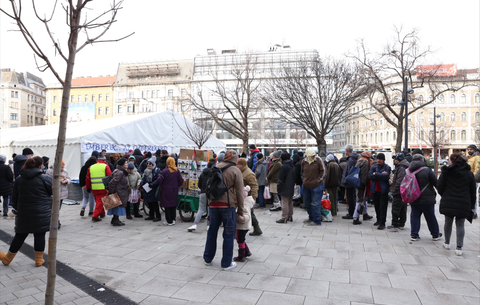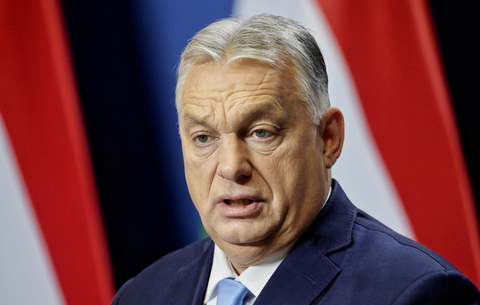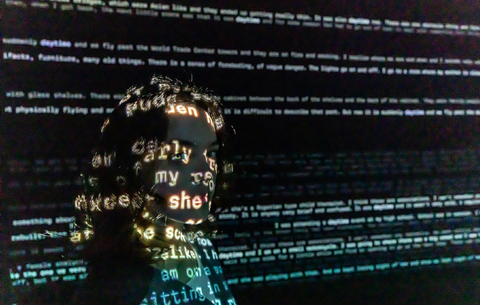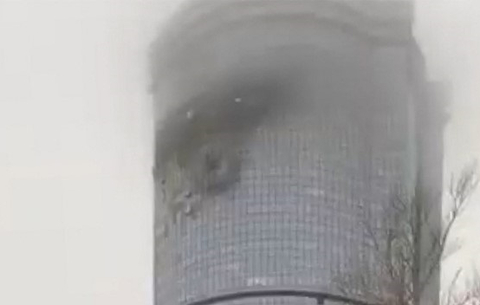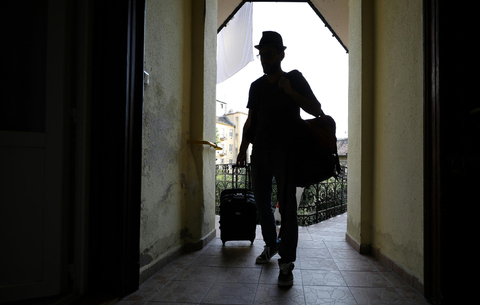The mayor on the weekends violence
Budapest rejects the aggressive Arpad Flag-toting extermists who call ever more openly for hate against the widest possible range of groups. "In this situation, if I must, I too will be Jewish, Roma or gay," said Gabor Demszky in a statement on Monday. His Free Democrat party is calling for a five-party statement, while Fidesz and the Christian Democrats condemn the government. Meanwhile, the Hungarian Democratic Forum (MDF) are rejecting "Arpad Flag hooliganism".
Demszky, who is mayor of Budapest, said physical attacks on people expressing their sexual identity, could not be allowed to pass without comment.
He said it was saddening that troublemakers bearing Arpad Flags claimed to be acting in the names of "normality."
"The truth is that what they are doing is far from what is regarded as normal in the world's democratic countries," said Gabor Demszky.
The mayor said: "It was the people who defied the threats and stood up for their rights at the weekend who showed true bravery." He thought it was "difficult to imagine behaviour more cowardly than wearing a mask and hiding away inside a crowd, while throwing stones and eggs at people you are sure will not rise to the provocation."
"As mayor, it is my duty in the name of every citizen to stand up for those who are persecuted in Budapest for their faith, ethnic origin or sexual orientation. Budapest says no to aggressive, Arpad Flag-toting extremists, who are calling ever more openly for hate against the widest possible range of groups. In this situation, if I must, I too will be a Jew, a Roma or gay. Budapest is our city. We cannot allow a situation where people feel fear because they belong to a minority," says the mayor in his statement.
The Free Democrats called for a joint statement to be signed by all five parliamentary parties, protesting against intolerance and homophobia in the wake of several people being beaten on Saturday evening during the Gay Pride parade.
Peter Gusztos, the party's spokesman, said he had written to members of the parliamentary human rights committee's members of all parties suggesting they issue a joint declaration against violence, intolerance and homophobia.
Fidesz has criticised the government and the police, but has issued no other statement.
Zoltan Pokorni, Fidesz's deputy chairman, said at a press conference that the issue was not homosexuality but about whether the Hungarian government and the police were capable of guaranteeing the right to free assembly.
"What we have today in Hungary is a situation where the government is either unwilling or unable to guarantee the right of Hungarian citizens - be they bisexual or homosexual - to free assembly," he said. He added that the police had shown brutality on 23 October last year, whereas now, the police had allowed similar violence to occur. Both cases needed to be condemned, he said.
He added that homosexuality was a private matter, whereas the police's inability or unwillingness to uphold the right to free assembly was not a private matter.
Zoltan Balog, the the Fidesz president of the parliamentary committee on human rights and minority, civil and religious affairs, said it was the duty of the police to uphold the universal right to free assembly and free expression, as well as to keep order in public places. "This is not an instance where we need political declarations or open letters. It's about the constitutional duties of the police," he said.
The European People's Party, which represents Fidesz, the MDF and the Christian Democrats in Brussels, also criticised police failures to guarantee the right to free assembly.
Andras Pettko, an MDF MP, said the Free Democrats had an inaccurate interpretation of the weekend's events.
He said: "The problem that every part has to act upon is the continuous street violence of a violent, Arpad Flag and national symbol-toting hooligan minority. As Hungarian Democrats, we will sign a declaration if it is to protest against this violent minority, because that minority respects neither the law on free assembly, nor a national celebration, nor the freedom of speech."
He added that Hungarian society had become increasingly tolerant of difference in recent years.



